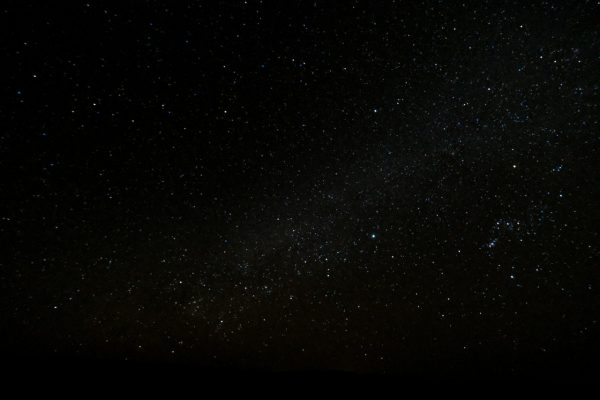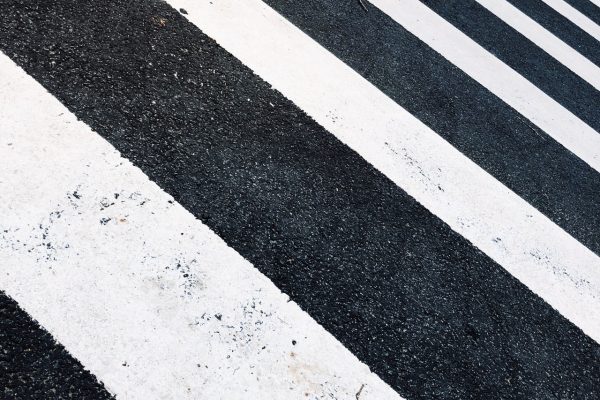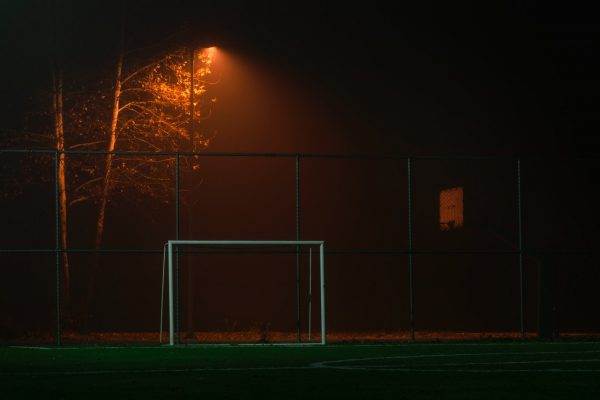It was two in the morning when I gave up on sleep. My last shift as a parking lot painter was last week, but my body was still disobeying the night. All summer, my shoulders loaded paint cans onto pick ups, my thighs pushed machines around moonlit malls, and my back stenciled stick men in wheelchairs on blue boxes. I lifted myself from bed, picking out my earphones before nudging my bedroom door into the hallway. My mother’s door was open and I peaked in. If she was anywhere other than deep sleep, she woke up to my sounds, but her body stayed still. Behind me was my sister’s door and it was closed. Light leaked from the bottom crack, but this meant nothing as she often fell asleep with the lights on.
I went into the bathroom and fished a lens from my contact case, pulled the bottom of my lid down, and placed it on my iris. I did the same with my other eye. Tears and solution spilled on my lashes. I wiped them off then rotated my head in the mirror to study my haircut.
When I got back to my room, I heard voices. The conversation came from the coiled earphones on my pillow. I followed the white cord to my phone, which was wedged between the mattress and bed frame. I was two hours into a Rogan podcast and I had no new texts. I put the phone on my desk and walked around the Korea suitcase, open and empty, containing nothing but a 12-pack of Cliff bars and full-size towel. Then I plucked a t-shirt from the puddle of work things on my floor: jeans, a safety vest, gloves, a breathing mask, a water bottle, and a black Jansport bag. They were all spotted with yellow and blue paint. I finished the water bottle and it tasted like hot car.
As I was pulling on my socks, I remembered the words spoken in the podcast and felt inspired. It said that my life was meaningful at worst, magical at best. However, with every step downstairs, this magic faded. On the second flight, I noticed a hole in the bottom of my sock. My skin pressing against the carpet felt truer than anything I’d heard on the podcast.
I stood at the entrance and decided against shoving into my shoes. Instead, I sat on the stairs to retie them. The crusted laces shed dirt as they looped and rubbed. After knotting them, I took note of the silence then twisted the doorknob. Forgetting that the wood expanded in the summer, an old fear shot through my body when the door groaned. The feeling faded to an assuring thought: my mother and sister had lived with both the door and I for 18 years.
Outside, my footsteps were just another sound in the night’s hum. I stuffed my earphones in my pocket and walked to the intersection. The light was red. No cars idled. The cool air was nice, as the only thing I did all day was sweat. I sweated on my bed while playing Candy Crush. I sweated on the couch while watching Game of Thrones. I sweated in the basement while typing an album review of Solange’s A Seat at the Table. The album was pain and confusion but ended with resilience. That’s all I had to say, but I typed seven paragraphs and shared it on Facebook. When the green man said so, I crossed the street.
There were dark houses and parked cars. Flowers sprouted from most yards. I heard growling cars in the distance and one woman crossed the street when she saw me approaching. Eventually, a chorus of hissing sprinklers drowned the roars from the main road and a park widened on the left.
I high stepped across the grass towards a bench. There were droplets on the seat and I wiped them with my forearm before sitting down. The bench faced a soccer field. A row of streetlights behind a row of trees stretched shadows onto the field. As a boy this would’ve scared me, but I no longer believed that monsters climbed out of the soil.
Earlier in the day, when it was sunny and I was walking to the barber, a car making a right turn didn’t see me crossing. It stopped four feet in front of my legs. I didn’t jump back—I just froze and looked at the driver, but her face said nothing about how she felt. After making it to the sidewalk, things changed. The cars seemed fast and the busses looked heavy. Everybody had a job. It was only after my haircut, when the sun dipped behind the suburbs that everything calmed down. The cars waited behind other cars. The busses sighed. Parents stretched out in front of TVs, forgetting the day.
I sat on the bench and its wood began to itch my thigh. The neighborhood was in bed, behind backyards, stairs, doors, and dreams. As I stood up, the city’s breath combed through the field and around my haircut ears. I watched the leaves shake and the shadows move. Then I walked back home with nothing to rest from, nothing to rest for, and nothing to forget.



